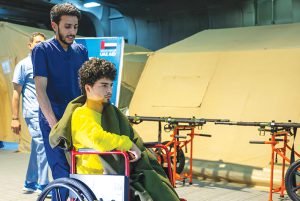AL ARISH / WAM
The UAE Floating Hospital in the Egyptian city of Al Arish has conducted a number of specialised and complex surgeries for Palestinian patients and the injured, as part of the medical services provided by the United Arab Emirates to Palestinian families in the Gaza Strip. The provided medical support falls within the framework of Operation Chivalrous Knight 3, ordered by President His Highness Sheikh Mohamed bin Zayed Al Nahyan, to alleviate the humanitarian crisis facing the Palestinian people in the Gaza Strip.
Dr Ahmed Mubarak, Director of the Hospital, said that the hospital’s specialist medical team has performed five delicate surgeries during the past two days, which are the first of their kind that have been conduced in state-owned field hospitals for patients suffering from complex compound fractures. He explained that the complex fractures were repaired using specialised titanium spinal nails, a procedure requiring the high level of expertise possessed by the treating medical team.
He pointed out that these complex procedures and specialised material necessitate the use of cutting-edge medical technologies and equipment. In response, the hospital has significantly ramped up its efforts in recent weeks to deliver comprehensive medical and surgical care to the wounded and injured from Gaza, particularly those requiring treatment with advanced medical supplies.
Mubarak explained that the total number of cases received by the hospital since its launch has reached 180, while the number of surgeries performed has reached 430 of various types at an average of 5 surgeries per day, pointing out that medical care and treatment are provided by medical teams from various specialties.
It is noteworthy that the UAE Floating Hospital launched its treatment services for the Palestinian brothers on February 24, and an Emirati medical team from all specialties supervises the hospital, whose capacity has increased to 120 beds from 100 beds, in addition to 100 beds for patient companions. It includes operating rooms for all types of surgery, in addition to intensive care and anaesthesia rooms, comprehensive outpatient clinics, and supporting medical services,
X-rays, a pharmacy, and a laboratory. Such advanced facilities enhance the hospital’s ability to provide comprehensive treatment for its visitors and beneficiaries in accordance with the best international standards and requirements that ought to be available in field hospitals.
 The Gulf Time Newspaper One of the finest business newspapers in the UAE brought to you by our professional writers and editors.
The Gulf Time Newspaper One of the finest business newspapers in the UAE brought to you by our professional writers and editors.
